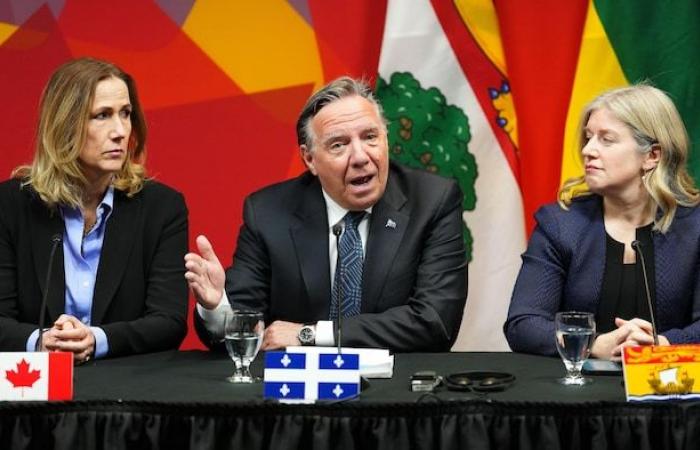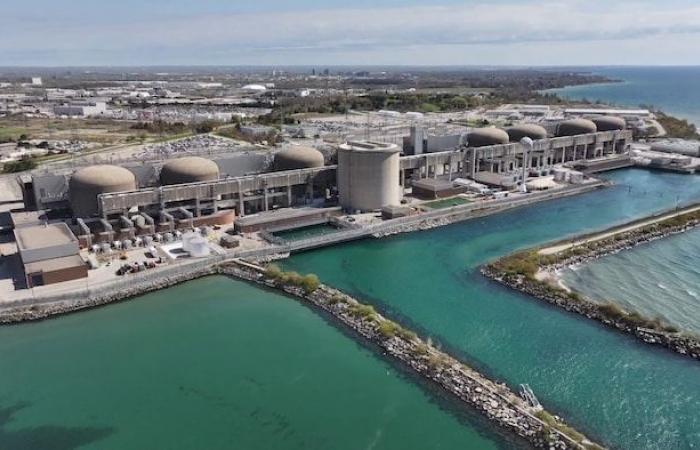In response to Donald Trump’s tariff threat, Ontario Premier Doug Ford has for weeks proposed a response that initially divided his counterparts, but which seems to be gaining popularity within the federation: suspending electricity exports to the United States. United.
As early as mid-December, the premiers of British Columbia and New Brunswick showed themselves open to following Ontario’s lead.
For their part, Alberta, Quebec and Newfoundland and Labrador initially fiercely opposed this type of response.
The Quebec Prime Minister and his Newfoundland counterpart have since changed their minds. Nothing should be excluded, including energy and electricity
declared François Legault on Wednesday.
Open in full screen mode
The Prime Minister of Quebec, François Legault, initially closed the door to using Quebec hydroelectricity in response to possible customs tariffs, but he seems to have modified his position in the last few days.
Photo: The Canadian Press / Sean Kilpatrick
To hear Doug Ford, the idea of cutting off the electricity supply is enough to make Americans shudder at a time when many Canadian politicians are pleading for a more muscular approach to Donald Trump.
They need Ontario’s energy
the Ontario Prime Minister once again insisted on Monday at a press conference. He said the province provides the electricity needed to power 1.5 million homes in New York, Michigan and Wisconsin.
Former Canadian Prime Minister Jean Chrétien agrees. If New York State did not receive electricity from Hydro-Québec, […] Trump would have to walk up Trump Tower
he joked in an interview with -.
Open in full screen mode
Jean Chrétien in interview with anchor Patrice Roy, in Ottawa.
Photo : - / Jonathan Dupaul
However, far from a punchy measure, experts believe that stopping electricity exports to the United States would above all be a sword in the water.
It would be essentially invisible on the American side and would be a big blow to the revenues of Canadian producers.
supports Pierre-Olivier Pineau, professor at HEC Montreal and holder of the Chair of Energy Sector Management.
Is this even a possible measure?
According to former Ontario Energy Minister Glenn Thibeault, Doug Ford has all the levers necessary to cut the province’s electricity exports to the United States.
Even though I don’t think we want to get to that point, it’s something that falls within the mandate of the current government
he maintains in an interview with -.
The measure could even be deployed without delay and without breaking contracts.
The Independent Electricity System Operator confirms that there are no export agreements between Ontario electricity producers and American consumers.

Open in full screen mode
The Independent Electricity System Operator is the organization that manages Ontario’s electricity system and ensures its reliability. (Archive photo)
Photo: - / Philippe de Montigny
All sales to the United States are made on markets that allow real-time exchanges between producers who have excess capacity and buyers who have immediate electricity needs.
[Les producteurs] could simply decide to reduce the quantities [d’électricité] which are offered or to continue to offer them, but at higher prices, since these are markets which operate by auction
indicates Mr. Pineau.
For its part, Hydro-Québec currently only has to honor one export contract to an American state: an agreement with Vermont which provides for the delivery of approximately 1.3 TWh of energy per year.
The supply planned in much larger contracts signed with Massachusetts and New York will not begin before the end of 2025.
Cutting off electricity: feasible, but at what cost for Canada?
According to data from the Canada Energy Regulator, Canadian producers provided 49.6 TWh of electricity to Americans in 2023, at a cost of $4.3 billion. This represented less than 3% of the country’s energy exports to the United States.
That year, Ontario exported the most.
Start of widget. Skip the widget?End of widget. Return to start of widget?
-The province’s two largest customers were Michigan and New York State. They imported 6% and 2% of their annual electricity consumption from Ontario, respectively.
Quebec, usually at the top of the list of electricity exports, has had to deal with historically low water levels in the reservoirs of its power plants in 2023.
Its electricity exports to the United States have fallen by more than 40%.
Start of widget. Skip the widget?End of widget. Return to start of widget?
No one in the United States really noticed the difference
maintains Mr. Pineau. According to him, American consumers were able to easily obtain their supplies from other sources in a highly interconnected North American electricity network.
It was especially the Quebec budget that suffered. The reduction in Hydro-Québec’s electricity exports in 2023 cost the public treasury $1.3 billion.
Ontario, for its part, sold $565 million worth of electricity to the Americans that year.
If the province’s energy producers were forced to deprive themselves of this revenue, they would have no choice but to pass on at least part of the bill to their customers who already pay on average almost twice as much for their electricity. more expensive than Quebec households.
Start of widget. Skip the widget?End of widget. Return to start of widget?
Ontario Newsletter
Subscribe to the Ontario newsletter.
Alternative electricity a little more expensive and more polluting
According to Ira Joseph, a researcher at the Center on Global Energy Policy at Columbia University, Americans would have little difficulty finding alternative sources of electricity.
But prices would certainly increase. Canadian provinces are low-cost electricity providers
he notes.

Open in full screen mode
Hydroelectric plants on both sides of the border in the Niagara region generate about a quarter of all electricity consumed in Ontario and New York. (Archive photo)
Photo : - / Patrick Morrell
Scott Laing, professor of finance at the State University of New York at Buffalo, believes that some large factories in the Buffalo area could feel more of the effects of a halt to Canadian exports, since they consume a lot of electricity produced in Niagara.
They would be the hardest hit, because they need this electricity, specifically this clean energy
he judges
On this subject, Mr. Pineau of HEC Montreal believes that it is mainly American producers of natural gas electricity who would benefit from the situation, they who would be called upon to increase their production to compensate for the loss of Canadian exports.
Shale gas producers would be extremely happy.
Additional costs for producers?
For Canadian producers, stopping electricity exports to the United States could not only mean a loss of revenue, but also result in additional costs.
It could cost money […] to have overproduction for which we have no outlet
explains Mr. Pineau.
Once you produce an electron, it has to go somewhere
recalls former minister Thibeault.

Open in full screen mode
Ontario’s nuclear power plants have difficulty modulating their energy production. (Archive photo)
Photo : -
During periods of low demand, such as at night, it is sometimes more profitable for producers to sell their electricity at very low prices, or even at a loss, rather than stopping their operations for a few hours.
The energy that is exported is available at times when no one else wants it.
underlines Mr. Pineau.
With information from Philippe de Montigny










